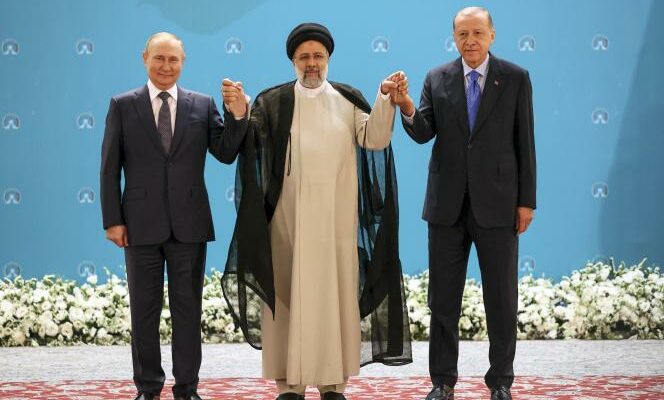Lhe strategic short-sightedness of Western leaders, first and foremost Barack Obama, has long enabled Vladimir Putin to consolidate, from Syria, a new balance of power of which Ukraine has fundamentally been the victim. This is how the White House’s pushback after the chemical weapons bombardment of Damascus suburbs in August 2013 convinced the Kremlin that reactions to the annexation of Crimea six months later would indeed be limited. .
It is therefore in Syria that the operational partnership between Russia and Iran has been transformed into a genuine alliance, with the development of combat drones now massively used against Ukraine. This Middle Eastern dimension must imperatively be taken into account in the analysis of the current crisis, under penalty of leaving Moscow to play alone on the two European and Levantine tables.
Get Israel out of the Russian trap
Benyamin Netanyahu, back in power in Israel after serving as prime minister from 2009 to 2021, has consistently chosen to rely on Russia to contain Iran’s influence in Syria. He considered that the Russian forces, directly engaged in Syria in September 2015, were the only ones capable of curbing the activism of the Iranian Revolutionary Guards and their affiliated militias, including Hezbollah. It is in this spirit that Netanyahu cultivated his personal relationship with Putin, interacting regularly with him, until the consecration of his invitation to Red Square on May 9, 2018, for the military parade commemorating the 1945 victory. Israel however, had to note that the Russian contingent in Syria, far from opposing Iranian intrigues, tolerated them, even encouraged them. The Israeli army was even forced to destroy in Syria drones of Israeli design whose license had been ceded to Russia, but which proved to protect movements linked to Iran.
Putin, an experienced arsonist firefighter, has thus fueled an Iranian threat in Syria which allows him to maintain indirect but continuous pressure on Israel. Only the Russian army can indeed authorize the Israeli raids in Syria, themselves essential to contain the Iranian aims on the northern border of Israel. The Russian trap has since closed on Israel, which has justified its refusal to deliver any military equipment to Ukraine by the priority given to its relationship with Moscow.
Volodymyr Zelensky’s repeated appeals have gone unheeded, even as the Ukrainian president insists that his country and Israel are both threatened by Iran. Misunderstanding is gradually tinged with irritation in kyiv, where Israeli missile defense devices would be very valuable. Moreover, Israel did not take part in the recent international conference of solidarity with Ukraine in Paris.
Weakening the alliance between Moscow and Tehran
Contrary to Netanyahu’s bet, the stronger Russia is in Syria, the stronger its alliance with Iran. It is in Syria that the Iranian Shahed drones (“Martyred”) 136, which today sow terror in Ukraine, have been developed and continue, no doubt in part, to be produced. It is also from Syria that Putin can exercise fearsomely effective blackmail against his Turkish counterpart.
It would be enough for Moscow to launch an offensive against the pocket of Idlib which, in northwestern Syria, still escapes the authority of Assad, to cause the exodus of hundreds of thousands, even millions of refugees. to Turkey. President Erdogan, accused by the opposition of such a humanitarian catastrophe, would have the greatest difficulty in winning the general elections next June. Such pressure from Moscow on Ankara explains the limits of Turkish support for Ukraine, despite deliveries of Bayraktar TB2 drones, now produced locally.
It is obvious that if Israel and Turkey, as well as the United Arab Emirates, finally rallied to Western sanctions against Russia, these would hit the oligarchs closest to Putin the hardest. Two companies based in the Emirates have already been sanctioned by the United States for helping to deliver Iranian drones to Russian territory. And the fear is now serious of a delivery of Iranian missiles to Moscow, in order to reconstitute stocks there which have been very weakened by the waves of bombardments on Ukraine. Because it is indeed from the Middle East that the Kremlin continues to withdraw essential resources on the military, financial and political level. It is such resources that must be struck, or at least compromised, to hasten the end of the tragedy in Ukraine. Vast program, comment those who, a year earlier, did not even imagine a Russian invasion of Ukraine. A very beautiful subject of reflection, in any case, on this first day of 2023.
